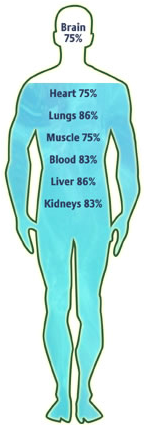Water and Health
|
Water: The Most Essential Nutrient
The body is made up of 70-80% water. Water is one of the four main nutrients of the body.Why is Water so important to our bodies?All chemical reactions in the body take place in water. Every cell in the human body is bathed in water, which contains materials to keep them vibrant. Water is a transporter of nutrients and oxygen for proper function of the body's tissues. Water helps remove waste from the body. Water acts as a natural air-conditioner through perspiration. Water is essential for digestion & absorption of vitamins and minerals. Water keeps our skin moist & supple, as well as a natural lubricator for our joints and internal organs. |
How safe is your water?
Click here to get your free water quality report. |

Does Our Body Store Water?
The body keeps a reserve store of fuel, such as stores of fat, which can be tapped in emergencies, but although we are made up of 70-80% water, we have no built-in water tank to tap into when running dry. Water is involved in every bodily function, so it's hardly surprising that it's lack can lead to mental and physical breakdown. As dehydration becomes severe the results can be alarming, for example, loss of elasticity in the skin, muscular weakness, severe dryness of the throat, disorientation, and finally hallucinations.
How Much Water Do We Need?
Over the course of an average day, the body loses approximately three quarts of water through breathing, perspiration and elimination. Through strenuous exercise or on a hot day, however our bodies can lose as much as three quarts of water an hour. This fluid must be replaced or the resulting occurrence of muscle cramping, dehydration, or heat stroke may take place. Water needs are especially apparent in certain groups of people. The elderly and athletes must pay special attention to their water requirements, especially in hot weather. The symptoms of dehydration may occur rather suddenly. Infants and people who are ill are particularly susceptible to dehydration symptoms.
The body keeps a reserve store of fuel, such as stores of fat, which can be tapped in emergencies, but although we are made up of 70-80% water, we have no built-in water tank to tap into when running dry. Water is involved in every bodily function, so it's hardly surprising that it's lack can lead to mental and physical breakdown. As dehydration becomes severe the results can be alarming, for example, loss of elasticity in the skin, muscular weakness, severe dryness of the throat, disorientation, and finally hallucinations.
How Much Water Do We Need?
Over the course of an average day, the body loses approximately three quarts of water through breathing, perspiration and elimination. Through strenuous exercise or on a hot day, however our bodies can lose as much as three quarts of water an hour. This fluid must be replaced or the resulting occurrence of muscle cramping, dehydration, or heat stroke may take place. Water needs are especially apparent in certain groups of people. The elderly and athletes must pay special attention to their water requirements, especially in hot weather. The symptoms of dehydration may occur rather suddenly. Infants and people who are ill are particularly susceptible to dehydration symptoms.
Flouride: The $$$ Money Connection
Who's monitoring it? Is it safe? Does it even prevent tooth decay? Flouride, it's not just in the water! Learn the real truth about the dangers of flouride as discussed on "Health Talk: A Second Opinion" with Dr. William Kellas and flouride expert Jeff Green.
Who's monitoring it? Is it safe? Does it even prevent tooth decay? Flouride, it's not just in the water! Learn the real truth about the dangers of flouride as discussed on "Health Talk: A Second Opinion" with Dr. William Kellas and flouride expert Jeff Green.
Is Water the Best Fluid Replacement?
Yes! Water leaves the stomach and enters the bloodstream quicker than any other liquid. Even though electrolytes and special sports drinks are popular fluid replacements, they are actually unnecessary for the average athlete (it has been shown that the sugar, glucose, sucrose, fructose in these beverages actually slows absorption time.)
Yes! Water leaves the stomach and enters the bloodstream quicker than any other liquid. Even though electrolytes and special sports drinks are popular fluid replacements, they are actually unnecessary for the average athlete (it has been shown that the sugar, glucose, sucrose, fructose in these beverages actually slows absorption time.)
We make it easy to get the pure, essential water your family needs.





